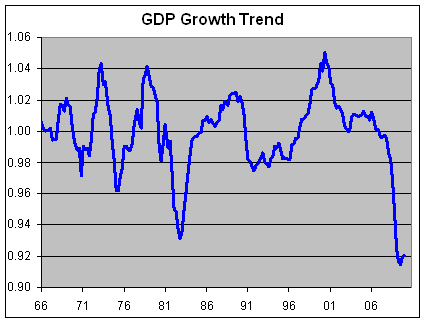Archive for April, 2010
-
Let Greece Default?
Eddy Elfenbein, April 30th, 2010 at 11:03 pmA Harvard economist says yes.
Rather than bail out Greece, therefore, the E.U. and IMF should allow it to default. This will hurt Greece’s creditors, but those entities assumed the risk when they loaned to a country long known for its profligate ways. In contrast, a bailout forces unwitting taxpayers to foot the bill for Greece’s sins. This can only breed resentment, not to mention reduced incentives for other countries to restrain their own spending.
If Greece does default, its economy may suffer in the short term. External credit will be scare to non-existent, so Greece will have to live within it means. This will require slashed pay-scales and benefits for civil servants and drastic cuts in the number of such jobs. It will also require the repeal of Byzantine regulation, burdensome taxes and policies that force a large fraction of the population to feed at the public trough.
But however painful this adjustment may be, it is unavoidable if Greece wants to join the first rank of nations; current policies are unsustainable from every perspective, so the sooner Greece abandons them the better. -
Mississippi Fred McDowell
Eddy Elfenbein, April 30th, 2010 at 2:46 pmIt’s a gorgeous day here in our nation’s capital. I think I’ve had enough of earnings reports, Senate committees and weasely bankers for one week. I’m closing the laptop, shutting off CNBC and turning over the festivities to Mississippi Fred McDowell. Enjoy.
-
Is the Stock Market Anti-Obama (or Vice Versa)?
Eddy Elfenbein, April 30th, 2010 at 2:30 pmAs the S&P 500 has climbed steadily upward over the past 14 months, so have the prospects for House Republicans.
Here’s a look at the S&P 500 along with the Intrade contract for the GOP to win the House of Representatives this fall.

Just recently, the GOP’s contract hit 50 for the first time. For the record, I don’t think it means anything. Both the state of the GOP and the stock market had just gotten battered, and both have regressed to the mean. That’s all that’s going on.
I’ve tried to warn investors not to read every bump and tick in the market as a political statement (see Kudlow, Larry for details).
But still, it’s an interesting correlation. -
You Know that Goldman Rally…Yeah, About That
Eddy Elfenbein, April 30th, 2010 at 1:48 pm
Last week, I said to stay away from Goldman Sachs (GS) believing it was a value trap. The share had a brief rally but that came to a halt today.Goldman’s Shares Plunge on Inquiries and Downgrades
Already facing investigations on two fronts into its practices in the mortgage market, Goldman Sachs came under pressure from investors as well on Friday.
After reports on Thursday evening that federal prosecutors had opened an investigation into trading at Goldman, raising the possibility of criminal charges against the Wall Street giant, the firm’s stock was downgraded on Friday by two analysts. Standard & Poor’s lowered its rating from hold to sell, and Bank of America Merrill Lynch dropped its rating from buy to neutral, citing the mounting investigations.
Investors responded by sending the stock down 9 percent in midday trading, to $145.89, contributing to an overall decline in financial shares on Wall Street.The downgrade from BofA is noteworthy because it’s so rare. It’s funny how these investment houses are so reticent about downgrading each other.
By no means am I suggesting collusion. Heavens no, dear reader!! All I’m saying is that 1+1 equals something somewhere between 1.99 and 2.01. Any other inference you draw is entirely yours. -
Earnings for Fiserv and Moog
Eddy Elfenbein, April 30th, 2010 at 11:21 amWe had two more earnings reports from our Buy List. After yesterday’s closing bell, Fiserv (FISV) said it made 95 cents per share for the first quarter which was a penny below Wall Street’s consensus (some services the consensus at 97 cents). The stock is getting hit by about 6.6% in today’s trading.
Frankly, I’m not too worried about a pullback in Fiserv. The stock has had a good run so some profit-taking is to be expected. The most important news in yesterday’s report is that the company stuck by its full-year EPS forecast of $3.96 to $4.07. My forecast is for $4.05.
Let’s remember what Barron’s said recently about Fiserv:Because Fiserv’s business is so steady, many investors value it on free cash flow, which has exceeded reported earnings in recent years — a favorable trend. Free cash flow hit $668 million in 2009, up from $603 million in ’08. The company is guiding Wall Street to expect more than $700 million this year. With a market value of $8.2 billion, investors are getting a free-cash-flow “yield” of nearly 9%, at a time when corporate-bond investors are happy to accept 5% or 6%. The stock historically has traded above 14 times free cash flow. With nearly $5 a share of free cash penciled in for 2011, that multiple suggests a price target near 70.
I agree.
Moog‘s (MOG-A) earnings report caught us by surprise. We knew it was coming soon, but didn’t realize it was today.
Nevertheless, the company reported earnings of 55 cents a share which was three cents better than Wall Street’s expectation. Moog made 55 cents per share in the same quarter one year ago.
This was the second quarter of Moog’s fiscal year. Overall, the company’s earnings are bouncing back nicely. In 2008, they earned $2.75 per share and that dropped to $1.98 per share last year. Last November, Moog said to expect EPS for this fiscal year between $2.15 and $2.35. They reiterated that in February. Today, Moog said it now expects $2.35 per share, so that’s good news.
This is from the company’s press release:The Company’s twelve month backlog of $1.1 billion is up over 20% from a year ago.
The Company has updated its guidance for the year. Sales for the year will be down very slightly from $2.12 billion to $2.1 billion, but the Company increased its forecast for net earnings and earnings per share. Net earnings are now projected at $107.4 million and earnings per share at $2.35, an increase of 19% over the previous fiscal year.
“The Company’s second quarter results exceeded our plan, particularly in Aircraft and in Space and Defense,” said R.T. Brady, Chairman and CEO. “Our Components Group delivered another solid performance. Wind energy and Medical Devices sales are developing a little more slowly than we’d planned but both show signs of improvement. The overall result will be a year better than our original forecast and we’re now forecasting a 19% improvement in earnings per share.”Although it’s one of the quietest stocks on the Buy List, Moog is having a very good year. The shares are up over 30% for us and the year is only one-third over.
Both Moog and Fiserv are excellent buys. -
The Economy Grew by 3.2% for the First Quarter
Eddy Elfenbein, April 30th, 2010 at 9:34 amThe government reported that the economy grew by 3.2% for the first quarter. Normally, that’s not so bad but for coming out of a deep recession, it’s very unimpressive.
Federal government spending, which includes remaining stimulus money, grew at an annualized rate of 1.4 percent in the first quarter of 2010. But this was more than offset by continued spending cuts from state and local governments, whose spending decreased 3.8 percent. It was the third quarter in a row in which state and local spending fell.
“Government spending contracted, for all the ballyhoo about stimulus,” said John Ryding, chief economist at RDQ Economics. “This recovery is going to have to stand on the backs of private-sector demand, not on government demand, given all the current fiscal challenges.” Even though any pickup in business is welcome, modest improvement may not be enough to alleviate the pain caused by the so-called Great Recession, many economists say.
The nation’s gross domestic product — a broad measure of goods and services produced in the country — is far below its potential, according to economists’ projections of where the economy would have been if it followed its long-term trend. Output would need to grow at least 5 percent annually for several years to get back on track — and perhaps more importantly, to lead to enough job creation to employ the 15 million Americans already out of work and the 100,000 new workers joining the labor force each month.Earlier this week, I took a stab at giving a letter name to this recovery. My guess for Q1 was pretty close but a tad too high (I had 3.5% instead of 3.2%). Here’s the up-to-date chart:

Thanks to several emailers, I’m going to call it an N-Shaped recovery.
Here’s a more sobering way to look at GDP. This chart shows real GDP divided by a trendline growing at 3.08% which is about the long-term rate of growth.

In other words, this shows you how well GDP is doing compared with its historic growth rate. We’ve fallen off a cliff and are in the process of splatting.
In previous recessions, the economy has snapped back sharply to its historic trendline (1.0 on the chart). By growing at 3.2% last quarter, the economy is barely making headway.
At 0.92, we’re 8% below the trendline. This is what the NYT means by growing at 5% for a few years to get back on track. If the economy grew by 5% a year — 2% higher than the long-term trend — for four years, then we’d finally get back to something resembling normal. -
Behold!
Eddy Elfenbein, April 29th, 2010 at 3:09 pmWhen Alexander saw the breadth of his domain he wept for there were no more worlds to conquer.
In other news: -
Do Superstitious Beliefs Affect Investment Decisions?
Eddy Elfenbein, April 29th, 2010 at 11:21 amDark Omens in the Sky: Do Superstitious Beliefs Affect Investment Decisions?
By Gabriele M. Lepori
Psychological research documents that individuals are more likely to resort to superstitious practices when operating in environments dominated by uncertainty, high stakes, and perceived lack of control over the outcomes. Based on these findings, we suggest that the stock market represents an ideal breeding ground for superstition and then test whether superstition-induced behavior affects investment decisions. Our empirical analysis focuses on some beliefs associated with eclipses, phenomena that are typically interpreted as bad omens by the superstitious both in Asian and Western societies, and we employ a dataset containing 362 such events over the period 1928-2008. Using four broad indices of the U.S. stock market, we uncover strong evidence in support of our superstition hypothesis in four distinct ways. First, the occurrence of negative superstitious events (i.e. eclipses) is associated with below-average stock returns, which is consistent with a diminished buying pressure coming from the superstitious. Second, the size of the superstition effect is estimated to increase in times of high market uncertainty and when eclipses draw wide media coverage and public attention. Third, the negative performance of the market during the superstitious event is followed by a reversal effect of similar magnitude (10 basis points per day) on the subsequent trading days. Fourth, eclipses are accompanied by a trading volume decline. When we extend our analysis to a sample of Asian countries, we find analogous results. The patterns we document are inconsistent with the Efficient Market Theory, as eclipses are perfectly predictable events.If anyone needs me, I’ll be reading entrails.
-
Obama Nominates Three to the Board of the Federal Reserve
Eddy Elfenbein, April 29th, 2010 at 10:56 amPresident Obama is getting the chance to place his stamp on the Federal Reserve. There were three vacancies and he just sent three nominees to the Senate for confirmation:
The White House tapped Janet Yellen, president of the San Francisco Federal Reserve Bank, to be the board’s vice chairman, and Massachusetts Institute of Technology economist Peter Diamond and Maryland state banking regulator Sarah Bloom Raskin to sit on the seven-member board. The Senate is likely to confirm them.
Just to clear up any confusion, the Federal Reserve is run by its seven-member Board of Governors. That’s what President Obama is filling out.
The interest-rate policy committee is the Federal Open Market Committee (FOMC) which has 12 members—the seven governors plus a rotating selection of five of the twelve regional bank presidents. The President of the New York Fed is always there.
Janet Yellen is currently the President of the San Francisco Fed so she was a member of the FOMC last year. San Francisco rotated off in 2010. -
Becton Dickinson Beats by Four Cents
Eddy Elfenbein, April 29th, 2010 at 10:48 amI’m happy to see that our stocks are rebounding nicely this morning. Two Buy List earnings reports are due today. Fiserv (FISV) will come after the close. Before the bell, Becton Dickinson (BDX) said it earned $1.27 per share which was four cents better than estimates. The company reaffirmed full-year earnings-per-share of $5.05 to $5.15 which excludes four cents due to Obamacare. Note that the March quarter is BDX’s fiscal second quarter so their fiscal year is already half over.
-
-
Archives
- March 2025
- February 2025
- January 2025
- December 2024
- November 2024
- October 2024
- September 2024
- August 2024
- July 2024
- June 2024
- May 2024
- April 2024
- March 2024
- February 2024
- January 2024
- December 2023
- November 2023
- October 2023
- September 2023
- August 2023
- July 2023
- June 2023
- May 2023
- April 2023
- March 2023
- February 2023
- January 2023
- December 2022
- November 2022
- October 2022
- September 2022
- August 2022
- July 2022
- June 2022
- May 2022
- April 2022
- March 2022
- February 2022
- January 2022
- December 2021
- November 2021
- October 2021
- September 2021
- August 2021
- July 2021
- June 2021
- May 2021
- April 2021
- March 2021
- February 2021
- January 2021
- December 2020
- November 2020
- October 2020
- September 2020
- August 2020
- July 2020
- June 2020
- May 2020
- April 2020
- March 2020
- February 2020
- January 2020
- December 2019
- November 2019
- October 2019
- September 2019
- August 2019
- July 2019
- June 2019
- May 2019
- April 2019
- March 2019
- February 2019
- January 2019
- December 2018
- November 2018
- October 2018
- September 2018
- August 2018
- July 2018
- June 2018
- May 2018
- April 2018
- March 2018
- February 2018
- January 2018
- December 2017
- November 2017
- October 2017
- September 2017
- August 2017
- July 2017
- June 2017
- May 2017
- April 2017
- March 2017
- February 2017
- January 2017
- December 2016
- November 2016
- October 2016
- September 2016
- August 2016
- July 2016
- June 2016
- May 2016
- April 2016
- March 2016
- February 2016
- January 2016
- December 2015
- November 2015
- October 2015
- September 2015
- August 2015
- July 2015
- June 2015
- May 2015
- April 2015
- March 2015
- February 2015
- January 2015
- December 2014
- November 2014
- October 2014
- September 2014
- August 2014
- July 2014
- June 2014
- May 2014
- April 2014
- March 2014
- February 2014
- January 2014
- December 2013
- November 2013
- October 2013
- September 2013
- August 2013
- July 2013
- June 2013
- May 2013
- April 2013
- March 2013
- February 2013
- January 2013
- December 2012
- November 2012
- October 2012
- September 2012
- August 2012
- July 2012
- June 2012
- May 2012
- April 2012
- March 2012
- February 2012
- January 2012
- December 2011
- November 2011
- October 2011
- September 2011
- August 2011
- July 2011
- June 2011
- May 2011
- April 2011
- March 2011
- February 2011
- January 2011
- December 2010
- November 2010
- October 2010
- September 2010
- August 2010
- July 2010
- June 2010
- May 2010
- April 2010
- March 2010
- February 2010
- January 2010
- December 2009
- November 2009
- October 2009
- September 2009
- August 2009
- July 2009
- June 2009
- May 2009
- April 2009
- March 2009
- February 2009
- January 2009
- December 2008
- November 2008
- October 2008
- September 2008
- August 2008
- July 2008
- June 2008
- May 2008
- April 2008
- March 2008
- February 2008
- January 2008
- December 2007
- November 2007
- October 2007
- September 2007
- August 2007
- July 2007
- June 2007
- May 2007
- April 2007
- March 2007
- February 2007
- January 2007
- December 2006
- November 2006
- October 2006
- September 2006
- August 2006
- July 2006
- June 2006
- May 2006
- April 2006
- March 2006
- February 2006
- January 2006
- December 2005
- November 2005
- October 2005
- September 2005
- August 2005
- July 2005
 Eddy Elfenbein is a Washington, DC-based speaker, portfolio manager and editor of the blog Crossing Wall Street. His
Eddy Elfenbein is a Washington, DC-based speaker, portfolio manager and editor of the blog Crossing Wall Street. His